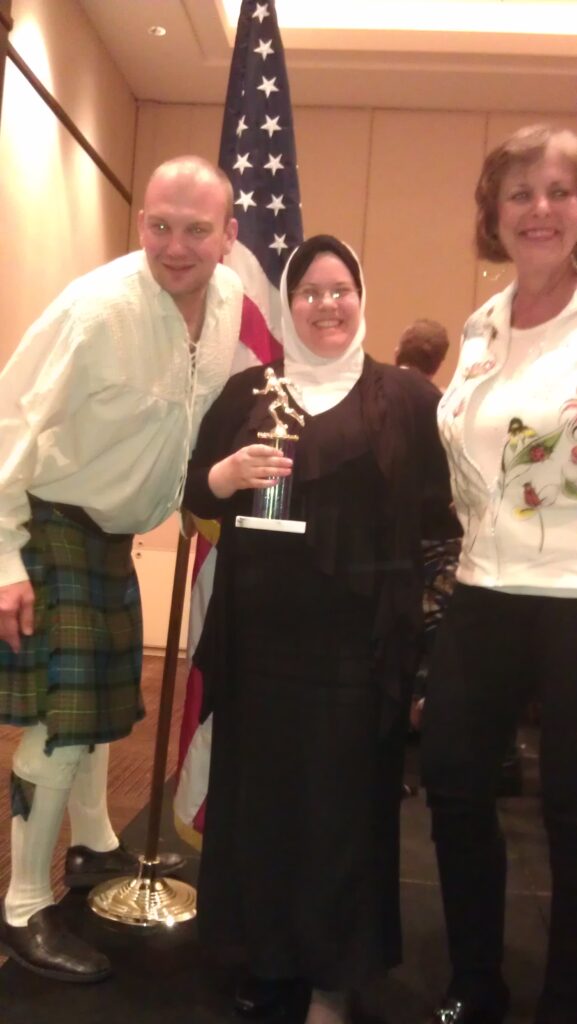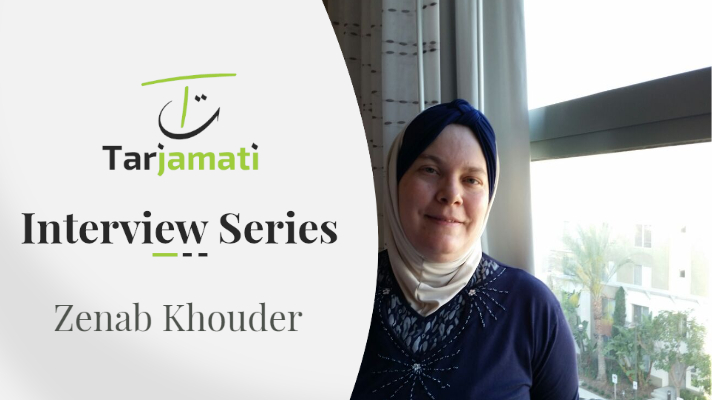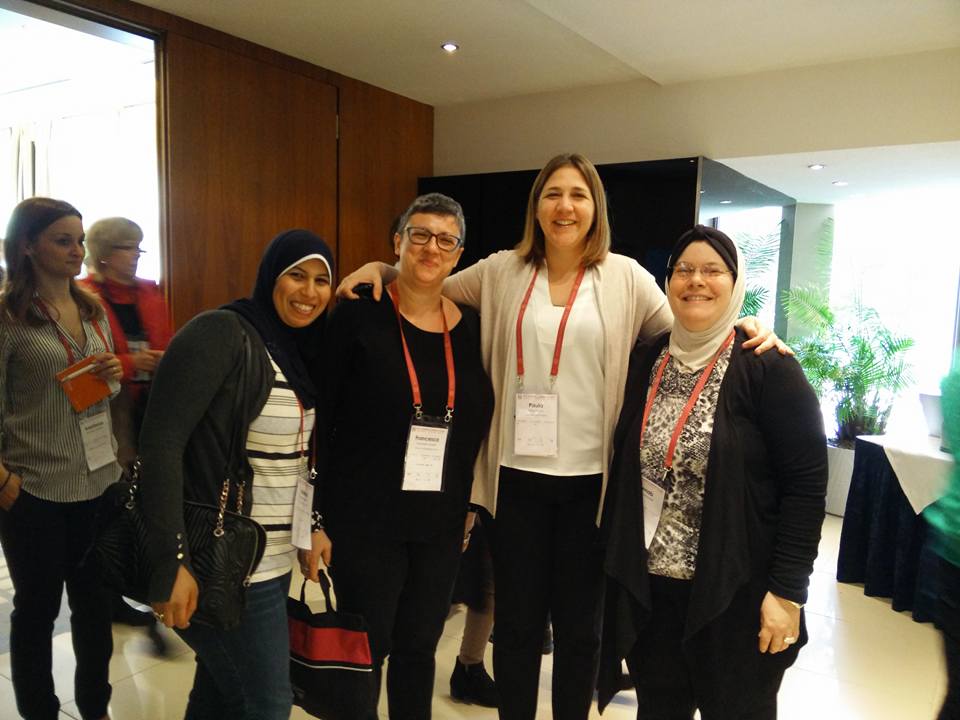Juggling between work and family, Zenab still stands out as a trailblazer who supports and empowers many in the field of interpretation.
This month, I interviewed Zenab Khouder, an Arabic interpreter and member of the American Translators Association. I join many translators and interpreters in admiring Zenab’s passion for spreading knowledge, and I believe she’s a trailblazer. Apart from serious work and the non-stop training links that Zenab shares with her colleagues to announce new exciting opportunities, Zenab surprises me with her strength as a mom 🙂 You will be instantly drawn to her fun conversations about multitasking between work and family even during conferences! I’m really happy to shed light on Zenab’s experience here! Happy reading!
Q1- Can you tell us more about your cultural and educational background?
My mother is from the Czech Republic and my dad is from Syria. I was born in the Czech Republic and moved to Damascus, Syria with my family when I was around 4 years old. I earned a degree in architecture from the Faculty of Agriculture in Syria before moving to the United States at 1990.
I got exposed to interpreting at a very young age when I interpreted for my mom and her friends who did not speak Arabic. My dad also interpreted for my mom often by watching American movies with Arabic subtitles and translating for my mom.

Q2- How did you focus on languages and translation work? And how did you find the passion for interpretation?
I took English classes in Syria and improved my language ability to further understand movies, songs, and to communicate with international students around me.
When I moved to the United States, I took a step further in educating myself through college English classes and through volunteer work in schools. I also got a job in teaching at a Sunday and Islamic schools.
One day a friend of mine who was a university professor came to me asking me to interpret at a courthouse in Austin, Texas. I explained to her that I am not an interpreter and that I have no experience professionally interpreting for anyone. She told me that she had seen me volunteer to interpret for parents, teachers, and students and that I had the capability and potential to professionally interpret.
After convincing me to go to court with her and assuring me that it won’t be difficult, I went and I did a great job. The judge at that court assigned me to be the official interpreter for that court in Austin, Texas (2000).
Thanks to my friend I knew what I wanted to be. I pursued a career in court interpreting and I took college classes at Austin Community Collage to aid in my journey. Shortly after, I started my own business (Echo Translation in the same city where it all started.
When I started interpreting we had a lot of refugees from Iraq, and so I volunteered at the Asylum Office and the shelters.
Passing the test to become a certified court interpreter was very difficult in California. But, after spending a significant amount of time training and studying, I finally got certified in Arizona and Illinois.
Even though, at the time I had more than 15 years of experience as an interpreter when I decided to become certified it took me 5 years just to get everything figured out and to understand what I need to accomplish to pass the test.

Q3- As a certified court and health interpreter, how do you describe the path to professional certification?
A court certificate is not easy to get. You need special training and about 4 hours a day of hands-on training for 3 consecutive months to earn the certificate. There was also no material for Arabic speakers to study for the court exam and no Arabic speaking trainers in the field. In fact, in California, the last time an Arabic court interpreter was certified was approximately 5 years earlier.
Q4- You have provided interpretation services over many years, serving the Arab community in legal and healthcare fields. When was your “super moment” and what was exciting about that project?
My “super moment” as an interpreter was at my first court trial when the defendant was going to be sentenced to life in prison because of the language barrier and the inability to communicate vital information. I felt as though God had sent me to her to help her and to reveal the truth that eventually set her free. I had finally found my purpose in life and that was to help people, like the refugees in the shelters, get a better life, and live their life free like they were meant to.
Q5- What was the scariest experience?
One of the scariest moments I witnessed was when a father fainted at the courthouse after the judge sentenced his teenager to prison.
Q6- I personally believe you’re a trailblazer in training! Can you share your thoughts on that with us? How do you find the time?!
I always loved coaching, training, and teaching. I got my teaching degree and I worked as a language teacher and an English Coordinator for a long while both in Syria and USA.
Since I enjoy learning as well as teaching, I have always searched for the best trainers in the interpreting field to learn better skills from them and spread the knowledge and help others through my teaching.
“We are smart and we cannot just sit around and wait for this virus to destroy our lives.”
Q7- After COVID-19, many official events and conferences were canceled, which impacted the jobs and careers of many interpreters around the world. How do you address this challenge? And how do you think interpreters can maintain a reasonable flow of work during this critical time?
COVID-19 changed our lives forever but that does not mean that our lives have stopped. We are smart and we cannot just sit around and wait for this virus to destroy our lives. We should keep going and we should invest in ourselves by studying more, learning new things, and getting better at adjusting to the new way of life without stopping everything. “when life gives you lemons, make lemonade.”
When life became virtual, I used the opportunity to start training other interpreters and help them achieve their goals.
Q8- Finally, what is your one golden rule with interpretation students or early-career interpreters?
My golden rule for new interpreters is to keep learning. Learning cannot stop, you have to keep learning every day even after you graduate and finish school. I still keep a notebook with me when I watch movies and TV to write down new words I learned and use them to better my vocabulary. Another important thing to remember for new interpreters is to surround yourself with friends who share your passion for interpreting and learning and to join a good association that will help you better yourself constantly.
So, in conclusion, what you need to remember as a new interpreter is: to keep learning, surround yourself with people that will benefit you, and always read about your profession to expand your knowledge and stay up to date with new information that you can use to better yourself.




Rollan
I’m so proud of you my friend. You deserve it!
You worked so hard to achieve your goals, and you did it. I know you still have more and more. Wish you the best, always 🥰
Eimib112@gmail.com
Zenab, through the short time I’ve known you since we attended ATA conference 2019, I always admired how active and passionate you are about our profession. I share some experiences of your childhood of listening to songs, watching movies and interpreting for others. Didn’t know this was the beginning for you! Now I’m even more motivated! Thank you for all you do. Thank you for always sharing the knowledge and supporting your fellow interpreters. Eimi